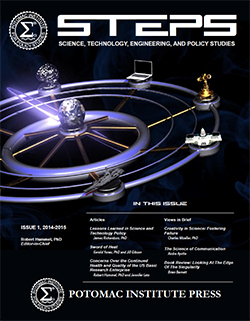Robert (Bob) Hummel, PhD
STEPS, Editor-in-Chief
Chief Scientist, Potomac Institute for Policy Studies
 Dr. Robert Hummel serves as the Chief Scientist of the Potomac Institute for Policy Studies in the Science and Technology Policy Division and is a member of the Center for Revolutionary Scientific Thought. He is the author of the Potomac Institute book, Alternative Futures for Corrosion and Degradation Research and is also serving customers in DARPA and OSD. He is the principal author of the Institute’s forthcoming book on machine intelligence. Prior to joining the Potomac Institute, he served as a program manager at DARPA for nearly nine years, managing and initiating projects in information exploitation, computer science, and sensor design. Prior to joining DARPA, he was a tenured faculty member at NYU’s Courant Institute of Mathematical Sciences in the Computer Science Department, where he did research in computer vision and artificial intelligence. Dr. Hummel earned his PhD in mathematics from the University of Minnesota, and he holds a B.A., also in mathematics, from the University of Chicago.
Dr. Robert Hummel serves as the Chief Scientist of the Potomac Institute for Policy Studies in the Science and Technology Policy Division and is a member of the Center for Revolutionary Scientific Thought. He is the author of the Potomac Institute book, Alternative Futures for Corrosion and Degradation Research and is also serving customers in DARPA and OSD. He is the principal author of the Institute’s forthcoming book on machine intelligence. Prior to joining the Potomac Institute, he served as a program manager at DARPA for nearly nine years, managing and initiating projects in information exploitation, computer science, and sensor design. Prior to joining DARPA, he was a tenured faculty member at NYU’s Courant Institute of Mathematical Sciences in the Computer Science Department, where he did research in computer vision and artificial intelligence. Dr. Hummel earned his PhD in mathematics from the University of Minnesota, and he holds a B.A., also in mathematics, from the University of Chicago.
Patrick Ennis, PhD
Senior Partner, Madrona Venture Group, and Senior Fellow,
Potomac Institute for Policy Studies

Dr. Patrick Ennis is a Senior Fellow at the Potomac Institute and has spent a career in science, technology commercialization, and venture capital. Patrick is also a Venture Partner at Madrona Venture Group where he helps build startup companies in a wide variety of technologies.
Prior to Madrona, Patrick was at Intellectual Ventures for more than a decade, running startup incubation and technology commercialization with a focus on Asian markets. His investments included Evolv Technology (Nasdaq: EVLV), of which he was a founding board member. Patrick was also the founding CTO of Xinova, a startup that pioneered an international open-innovation market network.
Previously Patrick was a Managing Director of ARCH Venture Partners, where he built early-stage startups for ten years. His investments included Impinj (Nasdaq: PI), Innovalight (acquired by DuPont), and Kotura (acquired by Mellanox/NVIDIA).
Before joining the venture capital industry as a Kauffman Fellow in 1998, Patrick worked at AT&T and Bell Labs, leading projects in software development, speech recognition, and network design. He also worked as a product manager in optical networking and a marketing manager for consumer services.
Before joining Bell Labs, Patrick researched nuclear physics at government labs in North America and Europe. During this time, he published many articles in scientific journals, including The Physical Review, Zeitschrift für Physik, and Nuclear Instruments and Methods.
Patrick has served on the boards of more than 25 private and public companies and educational organizations. In the last two decades, Patrick has spent more than 1,000 days abroad conducting business in 31 countries and developing relationships with technology, corporate, and academic leaders. Patrick holds a Ph.D., MS, and MPhil in physics from Yale, an MBA in finance from Wharton, and a BS in mathematics and physics from William and Mary, where he was elected to Phi Beta Kappa.
Ted Glum
Member of the Board of Directors, Potomac Institute for Policy Studies

Ted J. Glum is a member of the Board of Directors of the Potomac Institute. He is the former Director of the US Defense Microelectronics Activity (DMEA), serving in that capacity from its inception in 1996 to his retirement in 2018. As the Director, Mr. Glum reported to the Assistant Secretary of Defense for Research and Engineering, and was responsible for over $2 Billion of microelectronics technology programs in addition to numerous classified programs for the Department of Defense (DoD) and Intelligence Community. DMEA capabilities that he oversaw included a one-of-a-kind flexible foundry which enables DMEA to provide critical parts for intelligence, special operations, and combat missions as well as providing parts that are unobtainable in the commercial market, and has been designated as a Critical National Resource by the US Government.
Lois Hollan
Senior Fellow, Potomac Institute for Policy Studies

Lois Hollan is a Senior Fellow with the Potomac Institute for Policy Studies, and has worked in Washington, DC as a management consultant for US Government Science & Technology programs since 1990. Ms. Hollan has focused on management of complex, high-risk development programs for over 25 years, working largely with the Defense Advanced Research Projects Agency (DARPA). She supported multiple advanced research programs at DARPA and other government agencies in the areas of image understanding, computer vision, automatic target recognition, and airborne video technology communities. Working with the House Science Committee in 2007, she made critical contributions to the legislative drafting and congressional responses related to the Advanced Research Projects Agency – Energy (ARPA-E) bill, leading to passage in 2009. She currently provides management and strategic consulting under the High-Performance Computing Modernization Program to develop rapid simulation technology services in highly complex, physics-based design environments. She has also provided program development support for the National Geospatial-Intelligence Agency Research Division.
In 1983, Lois Hollan was one of the first women in the world to drive a bobsled at the Olympic venue in Lake Placid, NY and became an international leader in the advancing of the sport for women. Those efforts led to worldwide competition and the adoption of the Women’s Bobsleigh Olympic event in 2002.
Rindha Sudhini
Student Intern (Sept 2023–Jan 2024), Potomac Institute for Policy Studies

Rindha Sudhini is a rising senior at the University of Pennsylvania where she is majoring in Philosophy, Politics, and Economics with a focus on Public Policy and Governance. In 2023, she completed the Potomac Institute S&T Internship program, where she investigated the relationship between AI/ML applications and civic engagement. Driven by a deep passion for policy, both domestic and foreign, Rindha plans to attend law school after graduation, where she hopes to leverage her understanding of the law to strengthen her advocacy and research efforts.
John Wilson
Senior Fellow, Potomac Institute for Policy Studies

John Wilson is a tech entrepreneur and investor with broad experience across climate tech and innovation structures. For eight years he helped speed US development of electric-drive systems as founding director of a DARPA-funded consortium on transportation advances now known as the Center for Transportation and the Environment. He was CEO of the eMotion Mobility venture with American Le Mans owner Donald Panoz and Daimler that developed an electric Smart car for car-sharing. And he advises Johnson Energy Storage, which aims to commercialize advanced lithium battery technologies invented by former Air Force/NASA rocket scientist Lonnie Johnson.
Early in his career he worked for two members of Congress developing incentives for renewable energy. He then helped expand them as Legislative Coordinator with the Solar Lobby and as founder of the Renewable Energy Institute. Wilson also co-chaired a staff group between Congress and the White House to speed the government’s digital transition of legislative and regulatory information. He later founded a Washington office for the Southern Legislative Conference and Southern Governors Association, which he headed for three years.
In 2012 he became a venture partner with Paladin Capital Group, a leading global investor in innovative cyber companies. For four years he was Board Advisor and then Chief Strategy Officer to a publicly traded SaaS delivery management firm. He also cofounded digital display firm NanoLumens and was founding Chairman of social media ratings firm Share Rocket.
In 2011, he helped launch GigTank, a global accelerator for startups on Chattanooga’s Gigabit-fiber network. For over a decade he has co-chaired the Technology Association of Georgia’s Top-40 innovative firm competition and has served as an investor, mentor or judge with Techstars, Georgia Tech’s Flashpoint, NeuroLaunch and CyberLaunch accelerators, Emory University’s Excellerator and Valor Venture’s Startup Runway. He earned his BA in Chemistry from Emory University.


